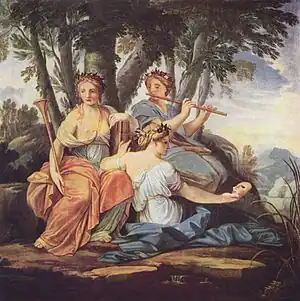Muse
See also: muse, musé, musė, muše, and Muße
English

Three Musæ: Clio, Euterpe, and Thalia
Etymology
From Middle English Muse, from Latin Musa, from Ancient Greek Μοῦσα (Moûsa).
Pronunciation
- enPR: myo͞oz, IPA(key): /mjuːz/
- Homophone: mews
- Rhymes: -uːz
Noun
Muse (plural Muses)
- One of the nine Ancient Greek deities of the arts.
- 1645, John Milton, Il Penseroso:
- And hears the Muſes in a ring,
- Ay round about Joves Altar ſing.
- 1645, John Milton, Il Penseroso:
Usage notes
The plural Musae can also be found, though it is much rarer than Muses.
Hyponyms
- (Greek mythology Muses) Muse; Calliope, Clio, Erato, Euterpe, Melpomene, Polyhymnia, Terpsichore, Thalia, Urania
Related terms
- museum
- music
Translations
one of the nine Ancient Greek deities of the arts
|
Anagrams
- Semu, emus, umes
German
Pronunciation
Audio (file)
Noun
Muse f (genitive Muse, plural Musen)
- A Muse (deity).
- A source of inspiration.
Declension
Declension of Muse [feminine]
| singular | plural | ||||
|---|---|---|---|---|---|
| indef. | def. | noun | def. | noun | |
| nominative | eine | die | Muse | die | Musen |
| genitive | einer | der | Muse | der | Musen |
| dative | einer | der | Muse | den | Musen |
| accusative | eine | die | Muse | die | Musen |
Further reading
- “Muse” in Digitales Wörterbuch der deutschen Sprache
- “Muse” in Uni Leipzig: Wortschatz-Lexikon
- “Muse” in Duden online
 Muse on the German Wikipedia.Wikipedia de
Muse on the German Wikipedia.Wikipedia de
Middle English
Alternative forms
- muse, mwse
Etymology
From Latin Mūsa, either directly or from Old French muse. Ultimately from Ancient Greek Μοῦσᾰ (Moûsa).
Pronunciation
- IPA(key): /ˈmiu̯z(ə)/
Noun
Muse (plural Muses)
- (Greek mythology) A Muse
- A source of inspiration for artists.
- (rare) A kind of art.
Related terms
- musike
Descendants
- English: Muse, muse
- Scots: Muse, muse
References
- “Mūse, n.”, in MED Online, Ann Arbor, Mich.: University of Michigan, 2007, retrieved 2018-10-30.